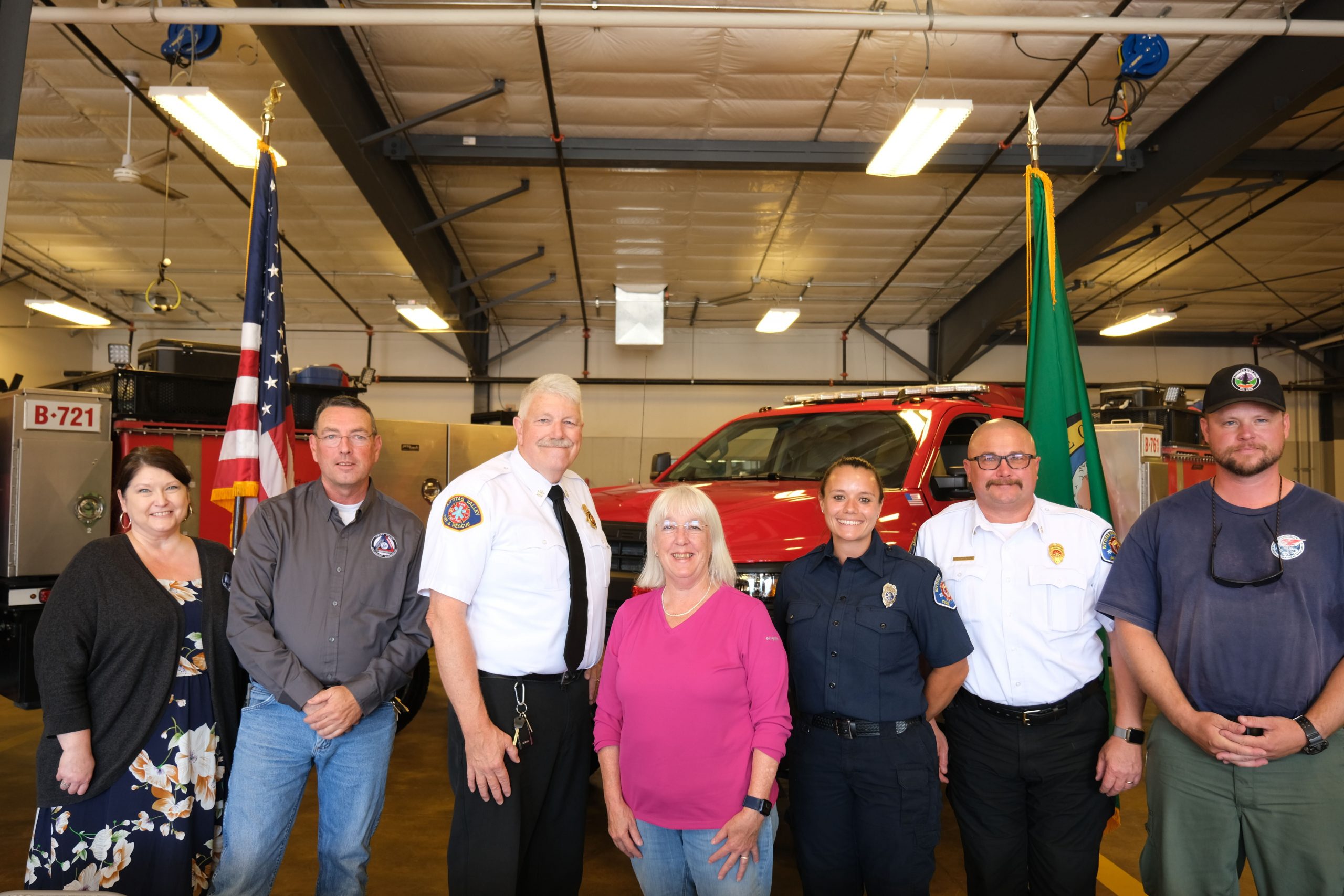***PHOTOS OF THE ROUNDTABLE HERE***
***VIDEO OF THE ROUNDTABLE HERE***
ICYMI: Senator Murray Pushes to Bolster Federal Wildfire Disaster Response – MORE HERE
Senator Murray: “Across the state, we’ve seen everything from devastating wildfires, to deadly heatwaves, to months-long droughts. That’s why I am continuing to push for action”
(Kittitas County, WA) – Today, U.S. Senator Patty Murray (D-WA) hosted a roundtable at Kittitas County Fire Station #73 with local firefighters and Kittitas and Yakima County officials on her work to bolster wildfire mitigation and prevention. During the event, Senator Murray underscored steps she’s taken thus far to prevent wildfires and she spoke directly with local officials and first responders on the ground about what needs to be done to protect Washington state communities and better support their efforts. Kittitas County has topped 100 degrees throughout the summer, highlighting the need for wildfire prevention and mitigation.
Senator Murray was joined by John Sinclair, Fire Chief of Kittitas Valley Fire and Rescue and Emergency Manager for the City of Ellensburg; Tony Miller, Director ofEmergency Management of Yakima County; Nicole Parpat, Grant Coordinator and Grant Writer for Yakima County; and Savannah Herrera Davies, Kittitas County Firefighter.
“Across the state, we’ve seen everything from devastating wildfires, to deadly heatwaves, to months-long droughts. That’s why I am continuing to push for action,” said Senator Murray. “The measures taken in the Inflation Reduction Act and the Bipartisan Infrastructure Law are big steps, but we need to do more to ensure our federal wildfire prevention and response efforts are able to meet this moment and account for the severity of fire seasons we’re now facing.”
“Climate change is happening. Forests are diseased, distressed, and mismanaged for decades,” said John Sinclair, Fire Chief of Kittitas Valley Fire and Rescue and Emergency Manager for the City of Ellensburg. “We need an integrated approach to this involving Federal, State and Local partners to mitigate the issues. We need good fire on the ground in the spring and the fall, to consume the fuel, small diameter sawmills, in central Washington, grazing and other fuels mitigation such as biomass, bio-char, and logging. If we do not, we will continue to wipe out communities and kill citizens.”
“As a Grant Specialist, I obtain funding for emergency responders. The main mission of first responders is to protect life and property. This requires the necessary staffing and equipment to minimize the loss of life and property,” said Nicole Parpat, Grant Coordinate and Grant Writer for Yakima County. “Grant funding increases the quality and capacity of response and care to the whole community. Lack of grant funding increases the probability of equipment failure, increases the risk to responders and compromises community safety.”
“With the wildfires increasing over the years, federal funding to help mitigate and respond to these fires is essential,” said Tony Miller, Director of Emergency Management of Yakima County. “The other issue that needs to be addressed is volunteer firefighters in the rural communities. These communities do not have the funds to staff full time firefighters. There needs to be incentives to help these communities increase their volunteer departments.”
“In order for us to better protect key infrastructure and natural resources, we need to be more proactive instead of reactive when it comes to managing and reducing fuels especially in the Wildland Urban Interface,” said Savannah Herrera Davies, Kittitas County firefighter. “This starts with educating the public about what they can do to protect themselves and their properties from wildfire. As we know, fire knows no boundaries so we need to work more cohesively when it comes to federal, state, and privately owned lands. To achieve this common goal, we need to focus more funding into preventative measures.”
The Inflation Reduction Act that Senator Murray helped pass earlier this month made historic investments in wildfire prevention, management, mitigation and recovery – including $5 billion in grants to support healthy, fire resilient forests, forest conservation, and drought and fire resilient agricultural practices.
Last year, Senator Murray also played a key role in passing the Bipartisan Infrastructure Law, which provided funding for community wildfire defense grants, mechanical thinning, controlled burns, the Collaborative Forest Restoration Program, and other federal firefighting resources. She also has fought to pass legislation that created a budget for firefighting efforts separate from the rest of the National Forest Service’s budget (commonly referred to as the fire funding fix). Senator Murray and her colleagues in Western states have been pushing for increased firefighter pay and were able to secure salary increases for firefighters across the country in the Bipartisan Infrastructure Law.
Senator Murray is a cosponsor of two bills to redesign and strengthen the federal government’s response to wildfires and provide additional resources to ensure equity for communities experiencing natural disasters. The FIRE Act would make several changes to the Stafford Act that governs FEMA—which was written when FEMA primarily focused on hurricanes, tornadoes, and floods—to ensure that FEMA’s disaster preparedness and response efforts fully address the unique nature of wildfires and their impacts on communities. This includes directing FEMA to pre-deploy assets during red flag warnings, improving relocation assistance for public infrastructure affected by fires, ensuring equity of assistance for tribal communities and tribal governments, and examining ways to speed up the FEMA assistance process.
Throughout her career, Senator Murray has prioritized securing the necessary funding for the Yakima River Basin Project and Columbia River Basin Project, which would transform water management and drought resiliency capabilities for the entire region, making a significant difference as Washington state works to fend off worsening fires and manage more severe droughts.
###


